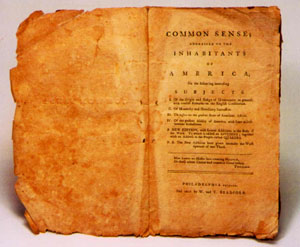Modern Inventions – The Submarines
I read the Freakonomics blog, but occasionally I wonder why. About one in five posts seems to offer some interesting little tidbit that merits some attention. Unfortunately, many of the rest offer pseudo-economic pablum and increasingly geriatric complaints. Today’s example is a post about how how reading standards have fallen since the 18th century. The evidence: Common Sense sold 500,000 copies in 1776, and books don’t sell nearly as well anymore.
Why this is supposed to be evidence for ‘literacy,’ I have no idea. Surely the author is aware that people engage in a massive amount of reading in the modern world wholly unrelated to books. The internet, for example, contains quite a few words.
Beyond that, Common Sense was written in the midst of a revolution that affected the lives of everyone in the fledgling country. Is it really that surprising that works of political philosophy feel less urgent to the citizens of this country these days?
The post also remarks favorably on “the sophistication of the writing and reasoning” in Common Sense. Which is also strange, since I’ve always thought Paine’s writing was hackneyed and poor, not to mention pretty simplistic. The whole premise of Common Sense was to take the complex ideas of the Enlightenment and strip away the musty philosophical notes.
If you want evidence of the 18th century public operating at a higher level of literary and political awareness a far better example would be the Federalist Papers, which are genuinely good pieces of pragmatic political thought in addition to being tremendously important for shaping popular consciousness. But even there we’re talking about a vanishingly small number of people who were genuinely engaged.
The basic point I’m making here is that people in 2011 have a massive number of things they need to be smart about, and a massive number of possible avenues for learning and self-expression. This obviously means that in some respects we are going to look inferior to previous eras on the issues of their focus. But people today can speak coherently about the strengths of the West Coast offense, about the psychological motivations of Tony Soprano, about the wonders of the umami flavor, about the emotional resonance of “Smells Like Teen Spirit.” They can follow earthquakes and hurricanes in real time. They can imagine what it is like to live on the other side of the planet. They can beat Angry Birds. And, if they are so inclined (and they should be!) they can read Thomas Paine. In fact, they can read it easily since it’s in the public domain.
There is, of course, some danger that if aesthetic and imaginative possibilities are too easily grasped we come to lose appreciation for them. But I think there are more interesting words being written today than at any point in history. I think there are more interesting songs being written today than at any point in history. And they can far more easily be shared with the rest of the world, too.


I agree. The books are good, but the blog is bad and the podcast is TERRIBLE.
This post really resonates with me as I do most of my reading online and sometimes feel judged when I tell people that I read very few actual books. I could probably find a happier medium, but it’s annoying that there’s often an assumption that whatever is being read on the internet is necessarily less valuable.
I’m also in agreement on the Freakonomics blog. I wonder if they’ve ever done some analysis on their own site traffic stats — I’m guessing it would suggest a need to reprioritize quality over quantity.